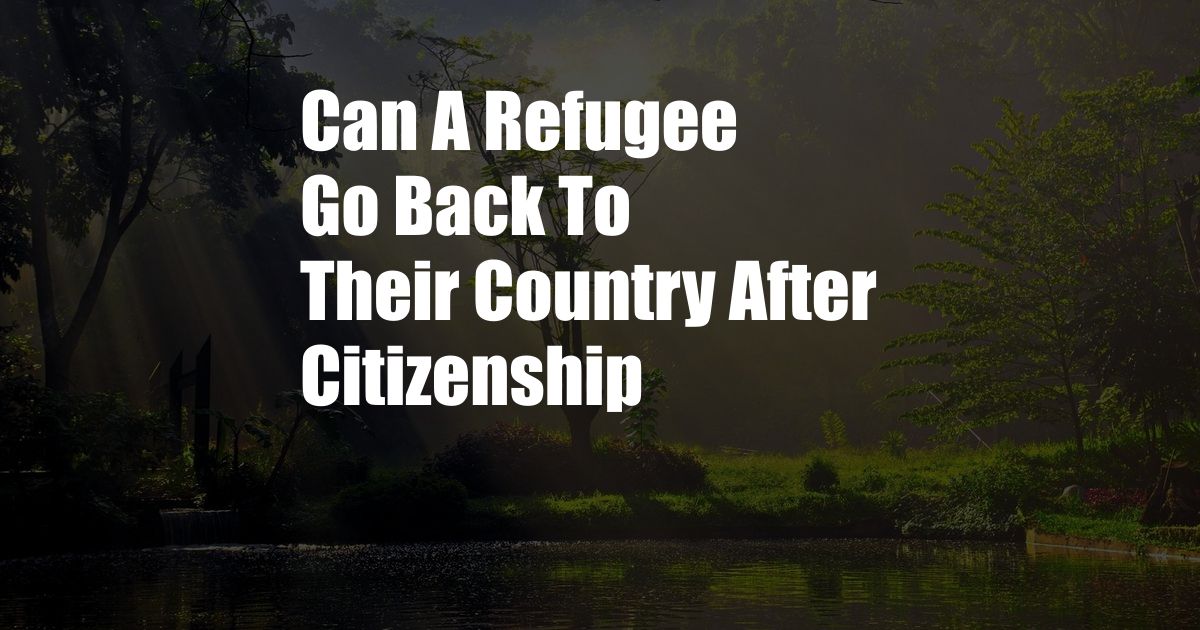
Can a Refugee Go Back to Their Country After Citizenship?
As the world faces unprecedented levels of displacement, refugees grapple with the complex decision of whether to return to their home countries after obtaining citizenship elsewhere. This profound choice often hinges on a myriad of factors, including the safety and stability of the homeland, the refugee’s individual circumstances, and their enduring ties to their former country. This article explores the nuances of this decision, delving into the legal, emotional, and practical considerations refugees must confront.
At its core, the concept of refugeehood involves individuals fleeing their homelands due to persecution, war, or other forms of violence or discrimination. Once they are granted citizenship in a host country, refugees gain the rights and responsibilities of their new nation, yet the decision to return to their homeland remains a deeply personal and multifaceted one.
The Complexities of Return
The decision to return home is often fraught with challenges. Refugees may fear for their safety or the safety of their families if they return to a country that remains unstable or dangerous. They may also have concerns about their ability to reintegrate into their former communities, as well as the potential loss of their newly acquired citizenship and rights if they return.
Moreover, refugees who have spent extended periods of time in their host countries may have established deep roots and connections that make it difficult to leave behind. They may have built families, careers, and social networks that provide them with a sense of belonging and stability.
In contrast, some refugees may feel a strong pull to return to their homelands, despite the potential risks and challenges. They may yearn for their former homes, communities, and cultural traditions. They may also have family members or friends who remain in their home countries and whom they wish to reconnect with.
In making their decision, refugees must weigh the potential benefits of return against the potential risks and challenges. They must consider their individual circumstances, the nature of their former country’s political and social climate, and their own personal values and desires.
Legal Considerations
The legal implications of return vary depending on the specific citizenship laws of the host country and the refugee’s former country. Some countries allow dual citizenship, while others may require refugees to renounce their newly acquired citizenship if they return to their homelands.
It is important for refugees to consult with legal experts and immigration attorneys to fully understand the legal implications of returning to their home countries. They can provide guidance on the specific laws and procedures that apply to their individual situations.
Practical Considerations
Aside from the legal and emotional implications, refugees must also consider the practical aspects of returning to their home countries. This may include arranging for housing, employment, and education, as well as reestablishing connections with friends and family.
Returning refugees may also face challenges related to language barriers, cultural differences, and economic disparities. They may need to learn new languages, adapt to different cultural norms, and find ways to navigate unfamiliar job markets.
Tips for Successful Return
For those who decide to return home, there are several steps they can take to increase the likelihood of a successful transition. These include:
- Conduct thorough research: Gather information about the current political and social situation in your home country. Contact refugee support organizations and connect with other returnees to gain insights.
- Plan ahead: Make arrangements for housing, employment, and education before you return. Identify resources and support systems that can assist you with your transition.
- Maintain connections: Stay in touch with family and friends who live in your home country. They can provide valuable support and assistance when you return.
Frequently Asked Questions
Q: Can refugees return to their home countries after obtaining citizenship in a host country?
A: The decision to return home is a complex one that depends on individual circumstances and the specific laws of the host country and the refugee’s former country. Some countries allow dual citizenship, while others may require refugees to renounce their newly acquired citizenship if they return.
Q: What are the challenges that refugees may face when returning to their home countries?
A: Refugees may face safety concerns, difficulty reintegrating into their former communities, loss of their newly acquired citizenship, and practical challenges such as finding housing, employment, and education.
Q: What steps can refugees take to prepare for a successful return to their home countries?
A: Refugees should conduct thorough research, plan ahead, maintain connections with their home countries, and seek support from refugee support organizations and other returnees.
Conclusion
The decision of whether or not to return to one’s home country after obtaining citizenship elsewhere is a profound and often difficult one for refugees. Refugees must weigh the potential risks and benefits, as well as the legal, emotional, and practical implications of their decision. By conducting thorough research, planning ahead, and seeking support, refugees can increase the likelihood of a successful return to their home countries.
Are you interested in learning more about the topic of refugees returning to their home countries after obtaining citizenship elsewhere? Share your thoughts and questions in the comments section below.